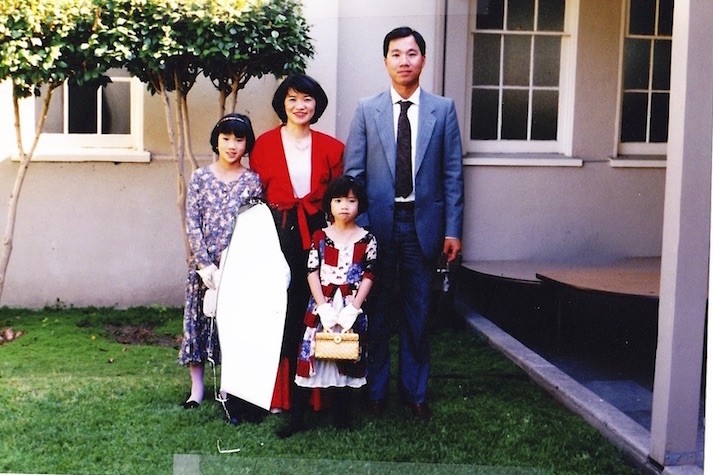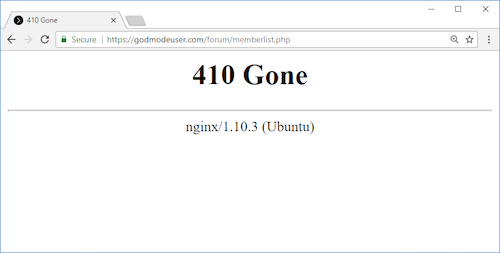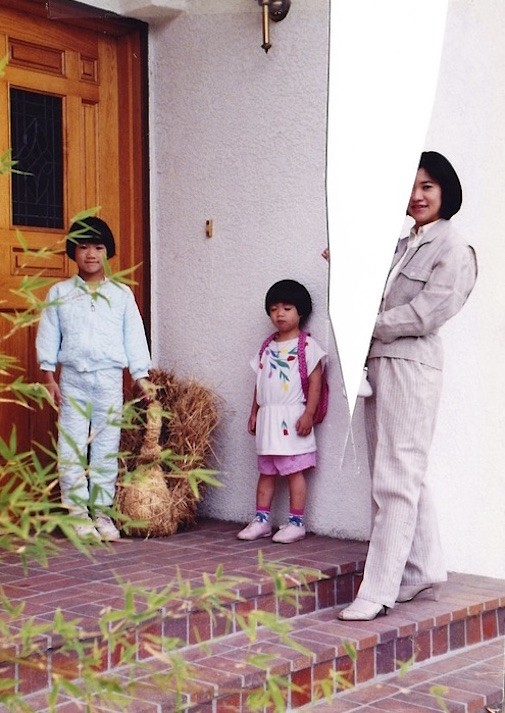Po(i)sed for Action: At the Intersection of Poetry and Drama, Part I

At the beginning, which was also the end, my twenty-four-year-old brother Oliver took his life in our childhood home, a home where I alone left when I could legally do so, leaving behind two younger siblings.
To return home for Oliver’s funeral meant returning to a place designed and built by my former-refugee immigrant parents as part of their great American Dream, its circle windows, invasive bamboo, and saloon and French doors. A place filled with silence, with physical reminders of violence, with three who never left.
When my father picked me up from the airport, he said, “There are only four of us now, and you are so far away.”
When he took the freeway exit, I filled the car. “Nice Carhartt beanie, father. All the hip kids are wearing one these days.” It was December.
“Do you like it? I have another one you can wear—it was your brother’s. He bought two of everything.”
In baby pictures, relatives used to say they couldn’t tell which ones were mine and which ones were Oliver’s. After he learned to walk, we’d gang up and pick on our sister, the middle sibling. Before he died, we were living on opposite coasts. When I looked out at the Atlantic, I wondered if he was facing the Pacific. Two faces looking out at dark waters—looking forward, looking back.
To go home meant a going back.
* * *
A cremation involves not only fire but also a coffin. In Oliver’s case, a rented coffin with a cardboard box inside cradling his trussed-up body.
When it was my turn, I tossed feline figurines into his coffin. He had always loved cats and wanted to get one—what was that breed he mentioned, having done so much research? The cats I sent him with to the afterlife were indiscriminate: plastic creatures from CVS, wild, domesticated, somewhere in between.
I like to think, if only he’d had a pet cat, he’d be alive. As a recent first-time dog owner, I’d been seeing harnesses and leashes for cats, and larger versions for walking toddlers, too.
I’d like to ask, What was that breed you liked, again?
* * *
Aftermath: new grass growing after mowing or harvest, a definition chiefly used in farming. A word of Germanic origin: after, meaning ‘after,’ and math meaning ‘mowing.’
A body just before its successful suicide may be posed, but there’s no guarantee how it’ll fall, or turn out after the act.
At the end of the funeral, we wheeled the coffin to the crematory, and someone pressed a button. The entrance opened like a garage door does, and we slid the cardboard box inside. The pilot light roaring at the end of chamber.
Before the funeral, I asked if we’d see the fire. “No,” someone said.
Someone rolled in grapefruits from the Buddhist altar.
I do not know if grapefruit ash is discernible from body ash, but all ash is water-soluble.
* * *
Before he killed himself, two years before, Oliver cut only himself out of the family portraits hanging in the hallway of our childhood home, making sure to leave the rest of the framed photographs where he found them. All of us were alarmed, made attempts to talk about it, but didn’t know how to address what had happened, and then silence resumed in the space between each of us.
Inaction is also a silence, so the marred photographs stayed up on the hallway until Oliver’s suicide, and afterwards, too.
All through that new year, when I walked down that hallway, I tried not to turn my head. I avoided the open door to Oliver’s intact bedroom, like walking around the radius of a bomb. I declined the double Carhartt beanie.
* * *
Surviving a loved one’s death has a way of removing filters from one’s life. Gone are the smokescreens. I exited a toxic long-term relationship, moved to a new state, began a PhD program. I’m not sure why Oliver’s death granted me a kind of tabula rasa, but it did. The fear I hadn’t known I’d been carrying, the possibility of learning of my brother’s violence (self or otherwise) was over. It had happened, so it couldn’t happen again. There was a relief in that for which I was not prepared.
What else I could not, did not know how to prepare for: reconciling with Oliver’s self-erasure, the transmutation of his body, and the shared childhood traumas I’d worked so hard to escape and then forget.
When I was asked in a course what a radical eulogy might look like, I immediately thought about the spaces in which I felt uncomfortable or could not access. In my initial drafts for a radical eulogy assignment, I found myself turning to ritual, a series of steps for someone (myself) to take.
* * *
Eulogy, from medieval Latin and also Greek, meaning ‘praise,’ but also related to words which mean ‘inscription on a tomb’ and ‘elegy.’ Typically for someone who has just died, of course. This etymology and definition involves language: speech or writing.
In thinking of how to honor my brother from the realm of the living, I did not and could not find words. I wanted to be with, be there beside him as he prepared for his death, as his body was prepared for the afterlife.
Unable to talk to or about Oliver, I began to gather information, to retrace my brother’s steps. What would it feel like to cut even part of one’s body out of a photograph? To cut any body out of its context?
* * *
In the play, 410[GONE], by Frances Ya-Chu Cowhig, a young Chinese American woman named Twenty-One travels to the afterlife in search of her lost younger brother, Seventeen—gone by suicide. The Land of the Dead is ruled by the Chinese Goddess of Mercy and Monkey King, a place which “resembles a disco, arcade, or pachinko parlor.” Here, visitors communicate through riddles and consoles, engaging in games such as Mercy and DanceDance Revolution.
A friend recommended the play to me, after hearing of Oliver’s suicide. Its parallels were immediately apparent, and I laughed and cried while reading it in one sitting—two emotional responses I had not had access to since Oliver’s death at that point.
In the game of Mercy, two players grab each other’s hands. On “go,” each one attempts to bend the other’s hand, with the goal of inflicting pain. When a player can no longer stand it, he or she cries “mercy” and is defeated.
Like me, Twenty-One plays detective, trying to collect information about her brother’s death:
Twenty-One uses the Junior Detective Kit to collect information about the closet. She wears a pair of reading glasses. A belt is wrapped around her head, like a crown. There is a brightly colored Band-Aid around her left thumbnail. She speaks to the open laptop.
TWENTY-ONE. When I wear your reading glasses, I notice new things. Like how the pole in your closet isn’t parallel to the ground, but slanted slightly East. Like an arrow, leading me to you. Remember how Amah said it was bad luck to cut your fingernails after dark, because it’s an invitation for a spirit to visit? I bite my nails all the time, so at night I don’t have any left to harvest. Garlic polish doesn’t work, because I kind of like the flavor. So I’m bandaging my left thumbnail to conserve it, but will nibble the rest at my leisure. I eat your last meal every night. I hate root beer. But I’m not giving up. There has to be something here. A code. Hidden between the wilted lettuce and processed cheese. Otherwise you wouldn’t have eaten it. Your burger had extra pickles. You hate pickles. Why did you order pickles then, out of all the days and nights of your life?
Though Oliver never ate fast food (he was a picky eater), the wrappers in the trash on the evening of his death revealed that he, like Seventeen, ate a burger. Did he eat McDonald’s because it would facilitate the two bottles of liquid phenobarbital that he drank? Or did we get it all wrong, not knowing him all along.
Twenty-One toils, struggling to reach her brother in the Land of the Dead. In the scene where she finally reunites with him, he doesn’t speak:
TWENTY-ONE. (Mock Asian accent.) Why you no talk? Forget speak? You write. I read. (Twenty-One tried to hand Seventeen a notebook. He ignores her. No accent.) Why did your cheeseburger have pickles? I need to know why your cheeseburger had pickles. (Seventeen ignores Twenty-One.) I’ll provide a series of answers. When I hit the right one—raise your hand. (No response.) Answer A: The extra pickles were a suicide note, telling me you felt trapped in a place of stasis. (Looks to Seventeen. No response.) Answer B: in the Dictionary of Dreams, a pickle is the symbol of speedy recovery. Ordering extra pickles was your way of self-medicating. (Static and the recorded sound of Seventeen breathing fill the closet. Only Seventeen hears them. Twenty-One turns away from Seventeen. A light falls on Seventeen’s belt. Seventeen mechanically repeats the exact motions of his suicide. He tries to resist—but he can only slow down the movement.) Ding ding ding! It’s Answer C: You knew I’d notice the peculiar pickle request. You made it to tell me the reason you killed yourself — the Answer to the Riddle — is me. (Seventeen opens the door of the closer. The recorded sound of his breathing get faster and faster. Twenty-One sees him.) Stop. (He steps into the closet and loops the belt around his neck. Twenty-One tries to move but is frozen in fear.) You’re already dead. You’re already dead. You’re already dead! (Seventeen lowers his knees, “hanging himself” Twenty-One screams.) MERCY! (On “MERCY,” Seventeen comes to stillness with the belt around his neck. A phone lights up in the Land of the Dead.)
* * *
Would That from Diana Khoi Nguyen on Vimeo.
To say that retracing the moments leading up to and then after his death was restorative, would be a lie. I feared that I, too, might end up dead while doing these actions, as if ritual could be a spell conferring Oliver’s suicide upon me—irrational of course, but I must acknowledge what feelings washed through me.
Retracing these moments as radical eulogy, elegiac ritual, enabled me to commune with Oliver. I did not yet have language, but a door opened in my grief. The way through it, with it, was through action.
Reading Cowhig’s play broke open multiple ways of approaching and accessing (or not accessing) the afterlife. While I do not have access to how Cowhig herself grappled with her younger brother’s death, I am able to witness Twenty-One’s attempt to reach and communicate with Seventeen, and am transformed by this experience.
There is something about the actions Cowhig’s characters undertake, toil, and suffer in—an absurdity in the layered realm of Asian American culture (and traditional folk elements) mixed with typical American experiences. An absurdity which bears verisimilitude to the experience of my life and the death of my brother.
I found poetry not only in Twenty-One’s attempts to converse with her brother, but also in the customized, personalized rituals of memory throughout 410[GONE].
Drama, from the Greek for ‘do, act,’ places foremost an emphasis on action, and action of course, is wordless. Drama also is defined as ‘a play,’ where play is that activity we engage in for enjoyment, recreation, something we take part in: we move, we represent, we perform.
Over a year after Oliver died, I did not have language for what happened, or how I felt about any of it. The words friends offered felt like cards placed at the perimeter of a bomb blast. I read elegies and experienced the heartbreak of others, but oddly felt nothing when I turned to my own loss.
I share this, all of it, to say that the offering of a play opened me up, got me moving again. And when I moved, I moved toward, not away from my dead brother. There were words, but they came later, and I’ll get to that in a later post.
In my experience, the ineffable, like trauma, may not be described in words, but it can be conveyed in movement, in gesture. A poised body posed for—
Poet and multimedia artist Diana Khoi Nguyen was born and raised in California. She earned a BA in …





![Frances Ya-Chu Cowhig, 410[GONE], poster](https://media.poetryfoundation.org/m/image/20653)
